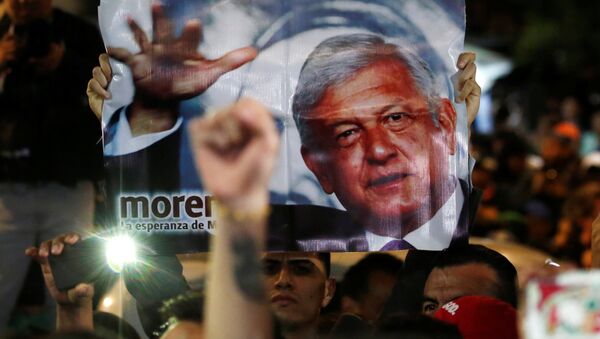Sputnik discussed the election outcome with Luis Gómez Romero, Senior Lecturer in Human Rights, Constitutional Law and Legal Theory, University of Wollongong.
Sputnik: Mr. Obrador has joined the presidential race before. What helped him claim the victory this time?
Sputnik: Do you think it's his popularity, his platform or the fact that many feel the current party had failed, they had lost a lot of trust and popularity, was it a combination of all of these factors?
Luis Gómez Romero: Peña Nieto's administration has failed in many fields, for example, regarding blossoming violence in Mexico, the war against the cartels was launched by the previous administration, previous two Peña Nieto administration and with President Felipe Calderón in 2006.
Peña Nieto continued with this policy that mainly entails involving the military in law enforcement. So in the last 11 years 230 thousand people have lost their lives in the Mexican drug wars. Obviously, the public is fed up with this level of violence, and they are demanding a change in the approach to this problem.
Luis Gómez Romero: Lopez Obrador has not actually promised to retire the military immediately, this is impossible; considering that the military has been used in law enforcement the police has been significantly undermined, so what he has proposed is to merge the police and the military into a National Guard under his direct command.
What is new in his approach to this problem is his proposal of an amnesty for petty drug traffickers or peasants who got involved in cultivating drugs.
He has not been very specific about how this is going to be done or how he’s going to implement the plan. However, his advisor have given some details on the amnesty and it has been positive. It’s a form of transitional justice that is a form of pacifying Mexico and a path towards reconciliation.
Sputnik: What do you think are going to be the most difficult things for him to do? Corruption was also high on his agenda but many are saying that’s going to be a very difficult and complex task and he would probably try to do something a little bit simpler to get started. What do you think his priorities are going to be? Do you think he’ll get around to fighting corruption? What has he proposed?
In the six years that Peña Nieto was in office, just to give you an example of the extent and the depth of corruption in the party and the regime, Mexico is a federation; it has 32 states plus Mexico City.
There are 14 governors that have been either investigated or have been convicted on corruption charges, and all of this happened under Peña Nieto's watch. What Lopez Obrador has proposed is, basically, to apply the law; a very basic principle is that no one is above the law.
The views and opinions expressed in this article are those of Luis Gómez Romero and do not necessarily reflect Sputnik's position.




